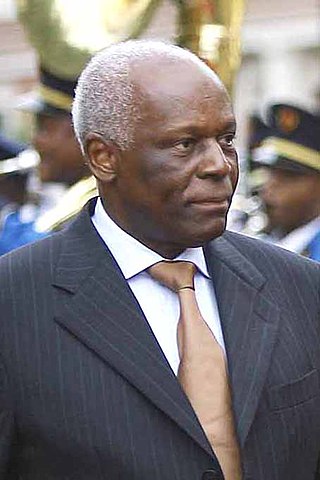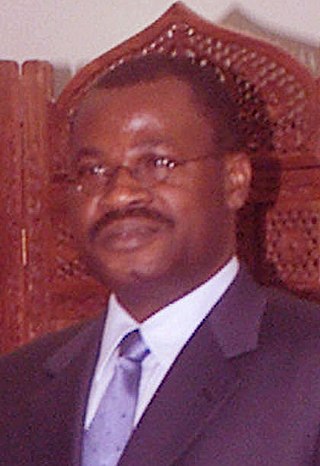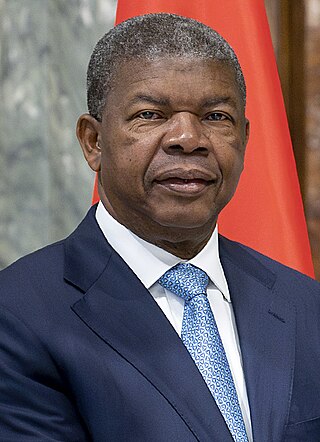| |||||
| Centuries: | |||||
|---|---|---|---|---|---|
| Decades: | |||||
| See also: | List of years in Angola | ||||
Events in the year 2022 in Angola .
| |||||
| Centuries: | |||||
|---|---|---|---|---|---|
| Decades: | |||||
| See also: | List of years in Angola | ||||
Events in the year 2022 in Angola .
Ongoing — COVID-19 pandemic in Angola
27 July - The Lulo Rose, a pink diamond, the largest in 300 years, is discovered at the Lulo mine in Lunda Norte Province, Angola. [1]
24 August - 2022 Angolan general election: Angolans vote to elect their president in a tight race between incumbent leftist candidate João Lourenço and center-right candidate Adalberto Costa Júnior. [2]
25 August - The electoral commission announces that President João Lourenço's MPLA has won the general election. [3]
24 September - Thousands of people protest in Luanda, Angola, accusing incumbent president João Lourenço of electoral fraud in the latest election, [4]

Angola, officially the Republic of Angola, is a country on the west-central coast of Southern Africa. It is the second-largest Lusophone (Portuguese-speaking) country in both total area and population and is the seventh-largest country in Africa. It is bordered by Namibia to the south, the Democratic Republic of the Congo to the north, Zambia to the east, and the Atlantic Ocean to the west. Angola has an exclave province, the province of Cabinda, that borders the Republic of the Congo and the Democratic Republic of the Congo. The capital and most populous city is Luanda.

The current political regime in Angola is presidentialism, in which the President of the Republic is also head of state and government; it is advised by a Council of Ministers, which together with the President form the national executive power. Legislative power rests with the 220 parliamentarians elected to the National Assembly. The President of the Republic, together with the parliament, appoints the majority of the members of the two highest bodies of the judiciary, that is, the Constitutional Court and the Supreme Court. The judiciary is still made up of the Court of Auditors and the Supreme Military Court.

Angola was first settled by San hunter-gatherer societies before the northern domains came under the rule of Bantu states such as Kongo and Ndongo. In the 15th century, Portuguese colonists began trading, and a settlement was established at Luanda during the 16th century. Portugal annexed territories in the region which were ruled as a colony from 1655, and Angola was incorporated as an overseas province of Portugal in 1951. After the Angolan War of Independence, which ended in 1974 with an army mutiny and leftist coup in Lisbon, Angola achieved independence in 1975 through the Alvor Agreement. After independence, Angola entered a long period of civil war that lasted until 2002.

The president of Angola is both head of state and head of government in Angola. According to the constitution adopted in 2010, the post of prime minister is abolished; executive authority belongs to the president who has also a degree of legislative power, as he can govern by decree.

José Eduardo dos Santos was an Angolan politician and military officer who served as the president of Angola from 1979 to 2017. As president, dos Santos was also the commander-in-chief of the Angolan Armed Forces (FAA) and president of the People's Movement for the Liberation of Angola (MPLA), the party that has ruled Angola since it won independence in 1975. By the time he stepped down in 2017, he was the second-longest-serving president in Africa, surpassed only by Teodoro Obiang Nguema Mbasogo of Equatorial Guinea.

João Bernardo de Miranda is an Angolan politician who is currently the Ambassador of Angola in France. He was Minister of External Relations of Angola from January 1999 to October 2008 and the Governor of Bengo Province from 2009 to 2018.
Lúcio Rodrigo Leite Barreto de Lara, also known by the pseudonym Tchiweka, was an Angolan revolutionary, physicist-mathematician, politician, anti-colonial ideologist and one of the founding members of the Popular Movement for the Liberation of Angola (MPLA). He served as General Secretary of the MPLA during the Angolan War of Independence and Angolan Civil War. Lara, a founding member of the MPLA, led the first MPLA members into Luanda on 8 November 1974. He swore in Agostinho Neto as the first president of the country.
The Roman Catholic Diocese of Kwito-Bié is a diocese located in Bié Province in the ecclesiastical province of Huambo in Angola. The cathedral is located in the city of Cuito.

Angola–Portugal relations are the bilateral relations between Angola and Portugal. Relations between the two are intrinsically tied because of the Portuguese Empire with Angola under Portuguese rule from 1575–1975.

Assunção Afonso de Sousa dos Anjos was an Angolan diplomat who was Angola's Minister of External Relations from 2008 to 2010.

Manuel Domingos Vicente is an Angolan politician who served as the vice president of Angola between September 2012 and September 2017. He was chief executive officer of Sonangol, Angola's state oil company, from 1999 to 2012, and he briefly served in the government as the minister of State for Economic Coordination in 2012. Vicente is suspected to be part of a "triumvirate" alongside Leopoldino Fragoso do Nascimento and Manuel Hélder Vieira Dias Junior, who built a secret banking network Banco Africano de Investimentos to transfer millions of dollars out of Angola from 1996 onward. While the US Treasury sanctioned the latter two in 2020 for misappropriating funds for personal benefit, they did not sanction Vicente.

João Manuel Gonçalves Lourenço is an Angolan politician who has served as the 3rd president of Angola since 26 September 2017. Previously, he was Minister of Defence from 2014 to 2017. In September 2018, he became the Chairman of the People's Movement for the Liberation of Angola (MPLA), the ruling party. He was the party's Secretary-General from 1998 to 2003.

Bornito de Sousa Baltazar Diogo is an Angolan politician who was the vice president of Angola, from 2017 to 2022. He was the vice presidential candidate for the MPLA in the 2017 Angolan general election, running alongside João Lourenço and a member of the Constituent Assembly since 2010. He was officially sworn in as vice president on 26 September 2017.
Events from the year 2020 in Angola.

General elections were held in Angola on 24 August 2022 to elect the President and National Assembly. Incumbent president João Lourenço was eligible for one more term. The MPLA was re-elected with a reduced majority, winning 124 seats with 51% of the vote. The main opposition party, UNITA won 90 seats with 44% of the vote. The Social Renewal Party (PRS), the National Liberation Front of Angola (FNLA) and the Humanist Party of Angola (PHA) each won two seats. The elections were the closest in Angolan history between the MPLA and UNITA.

João Baptista Borges is an Angolan academic and politician who served as Minister of Energy and Water under Presidents José Eduardo dos Santos and João Lourenço from 2011 to date. He was a professor of Engineering at Agostinho Neto University and he is a member of the Political Bureau of the Popular Movement for the Liberation of Angola (MPLA) since the 17th June 1998. He speaks fluently three foreign languages, English, French and Spanish.
Eugenio César Laborinho is an Angolan Lieutenant General and politician of the People's Movement for the Liberation of Angola (MPLA); Governor of Cabinda Province; Minister of Interior of Angola since 2019.
Events in the year 2023 in Angola.
João Jacob "Monstro Imortal" Caetano was an Angolan militant and politician who was a participant in the Angolan War of Independence and the Angolan Civil War. During his military career, he was promoted to the post of general and was vice-commander of the general staff of the People's Armed Forces of Liberation of Angola (FAPLA) and commander of the 9th Brigade of Mobilized Marines of the Special Forces of FAPLA. During his political career, he was a member of the Central Committee of the Movimento Popular de Libertação de Angola (MPLA) and a member of the leadership of the orthodox Communist Nitista-Fractionalist faction.
Gelson Caio Manuel Mendes, better known as Nagrelha, was an Angolan musician. He was a pioneer of the kuduro genre and one of its best-known stars.